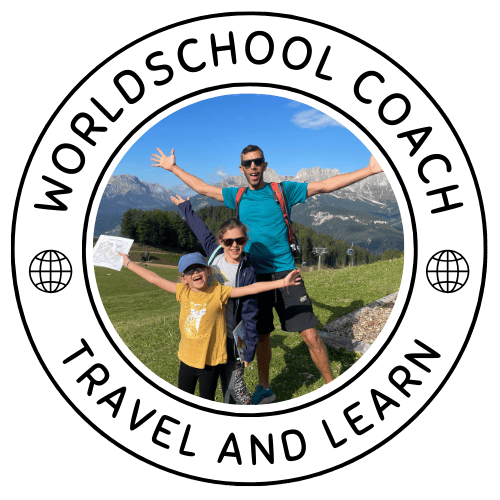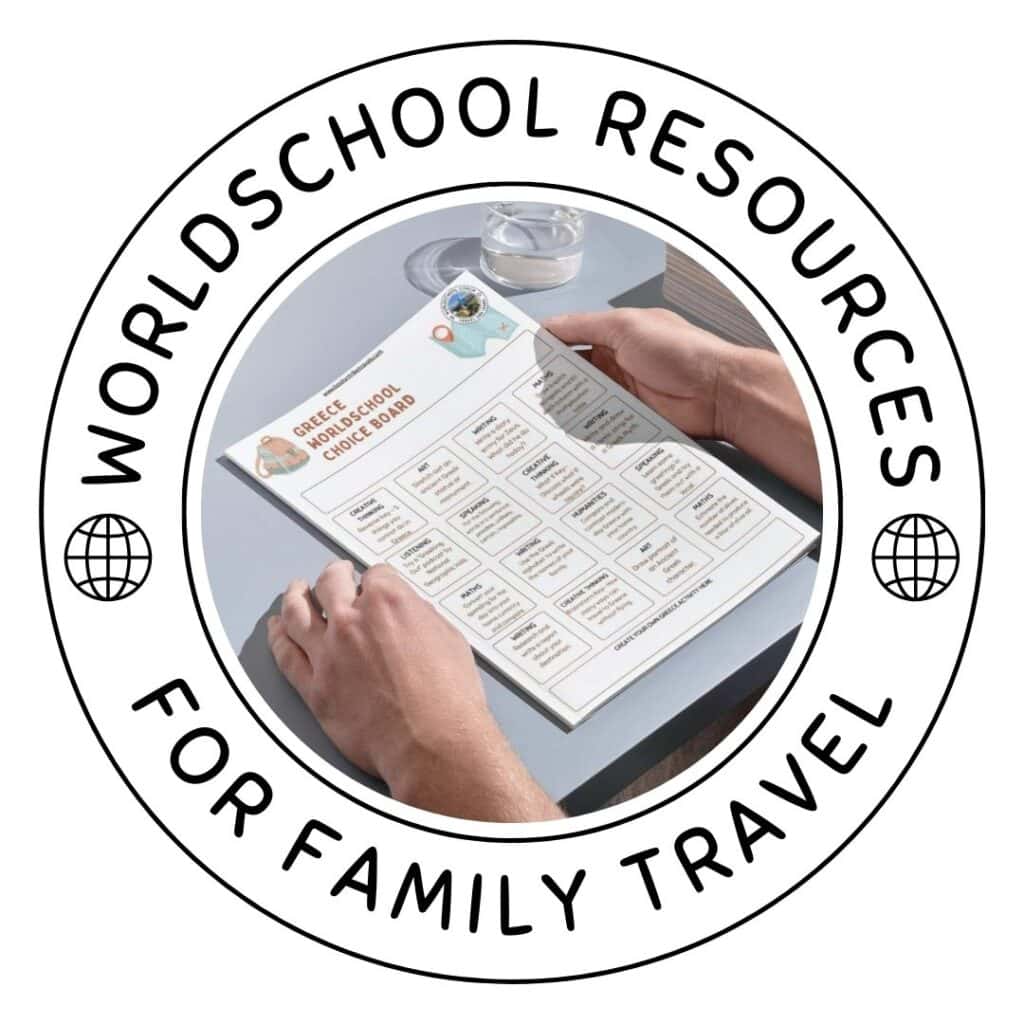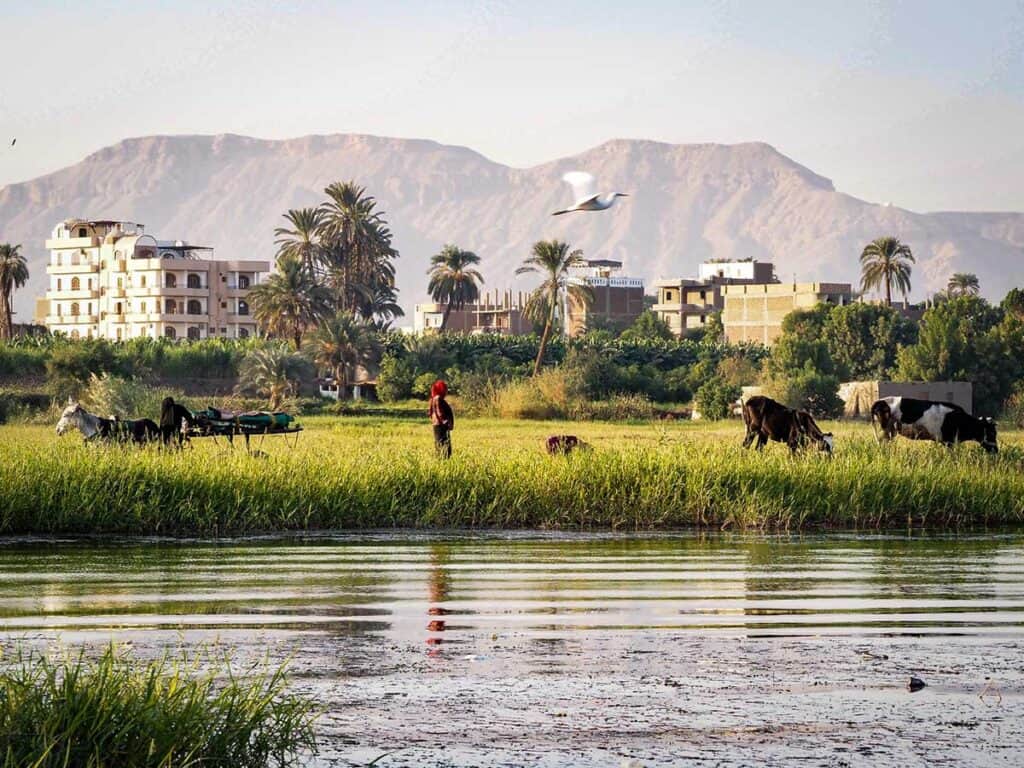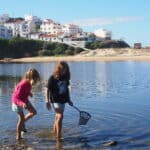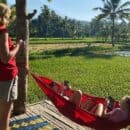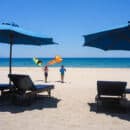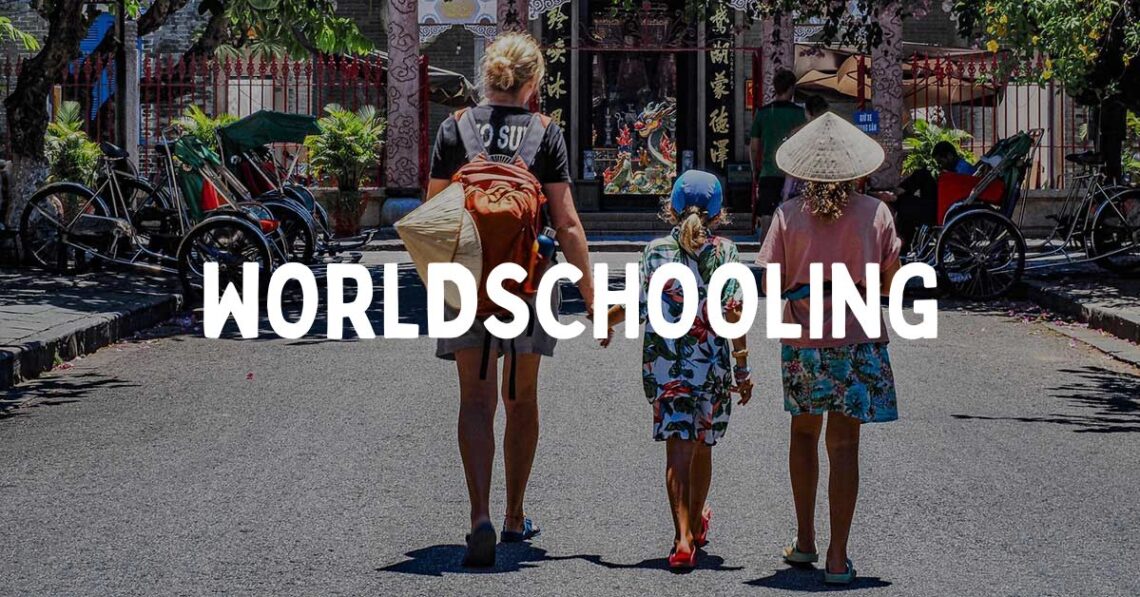
Worldschooling
Welcome to our Worldschooling Page, where education meets adventure!
Whether you’re a seasoned travelling family, on a family gap year, longterm travel or just dipping your toes into the world of homeschooling on the road, you’ve come to the right place.
We have embraced worldschooling as our educational philosophy and have loads to share to help you get started, enhance your journey or learn more about this educational opportunity.
Here, you’ll find resources, insights, support and guidance on how to worldschool and answer your questions about education whilst travelling.
From our comprehensive Worldschool Coach program designed to empower families to step away from traditional schooling to our Worldschool Tutor service, Blog Posts and worldschooling resources – we are here to help you on your worldschooling journey.
Or continue reading below for our Ultimate Guide To Worldschooling and find our
FREE WORLDSCHOOL STARTER PACK.
What is Worldschooling?
Worldschooling is an educational approach and lifestyle that embraces the world as the ‘classroom’. Families seek educational experiences from the places they visit. All travels big or small have potential to be a learning opportunity and the further you wander from your environment the broader the educational experience often becomes.
The philosophy is centred on experiential and hands on learning which aims to promote self-discovery, empathy, and a sense of responsibility in children.
Often families choose to embrace a mix of experience led and curriculum led learning to ensure a well rounded education but it can also lean more towards structured or unstructured learning, depending on each child, family or even destination.
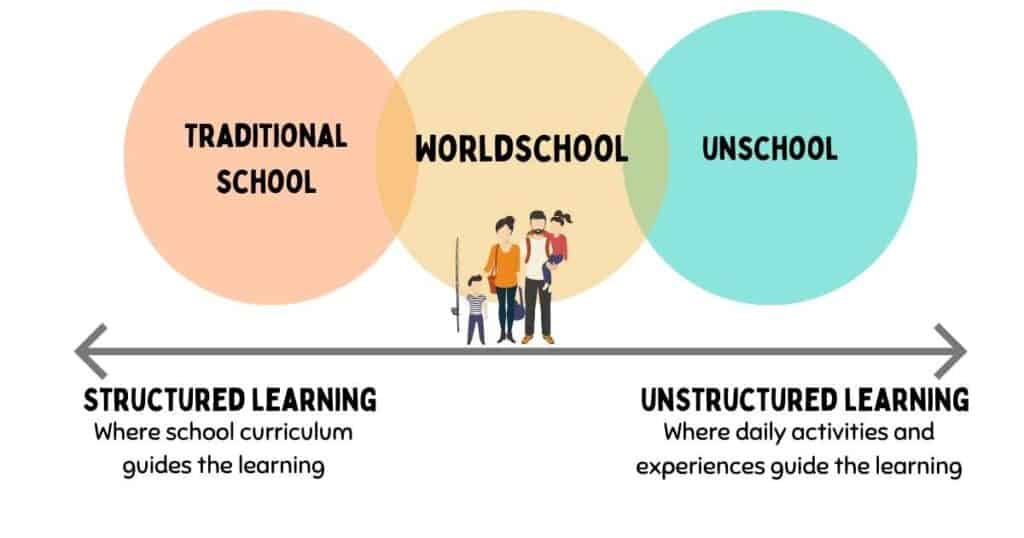
Most of the families we have met have been on long term travels or a family gap year, however, worldschooling is not just limited to those who travel full time. Worldschooling can be more of a mindset – where you seek educational opportunities from the different places you visit, near or far. However, I would say that the destinations you visit further away from your base the more diverse the educational experiences are, and therefore the greater the learning potential.
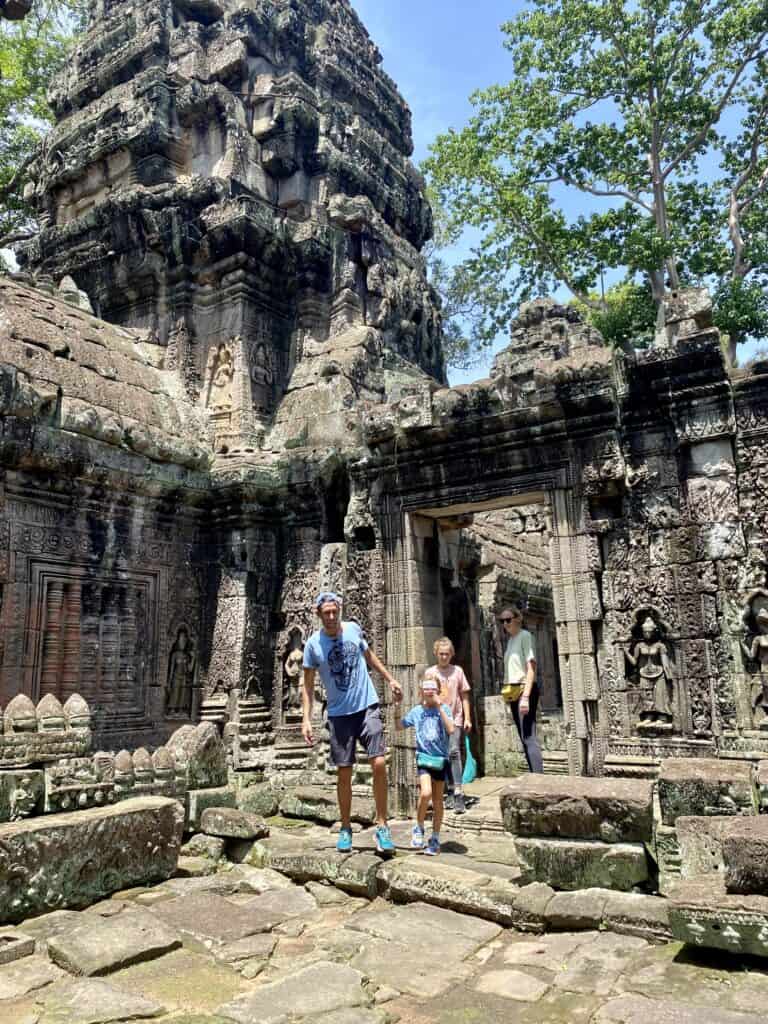
Is Worldschooling For me?
Worldschooling is a lifestyle choice open to anyone who is ready to embrace it, but it does come with certain considerations. Here’s what you need to know:
Financial Considerations: Traveling requires funds, and while overseas travel can sometimes be more affordable than living in a high-cost area, you’ll still need financial resources to sustain your journey. This could come from remote work, flexible jobs, or passive income sources like digital nomad families often have.

Family travel doesn’t have to break the bank
Career Flexibility: Worldschooling often requires a flexible approach to work. If your job allows for remote work or you’re able to take a career break, worldschooling might be more feasible.
Legal and Government Considerations: Worldschooling falls under the umbrella of homeschooling in many countries. While it’s legal and accepted in some, others may have stricter regulations or even prohibit homeschooling. Researching the legal status in your country is crucial.
Age and Education: Worldschooling can be easier with younger children, as the national curriculum is lighter and more flexible. However, as children get older and the educational requirements become more stringent, worldschooling may require more planning and consideration.
Personal Commitment: Worldschooling requires a significant commitment from parents or guardians. It’s not just about the financial aspect but also about dedicating time and effort to ensure your child receives a well-rounded education.
While worldschooling may present challenges, we will get into those shortly, with careful planning and consideration, many families have successfully embraced this lifestyle and reaped its rewards.
Our Worldschool Story
Our journey into worldschooling began when we left our teaching jobs and life in Brunei and started our family ‘gap year’ (spoiler alert – a year wasn’t enough for us). We wanted to travel – show our children more of the world, spend quality time together, chase freedom and educate the kids through travel experiences.
This shift from traditional education to a more experiential approach has been eye-opening, offering a unique perspective on the challenges and rewards of worldschooling. My family and I are passionate about exploring the world, not just as tourists but as engaged learners, and are currently travelling full time and loving it! That ‘gap year’ turned into a lifestyle and educational philosophy that now drives our goals.
As a primary school teacher I have always believed that children learn best when they are actively engaged in their education. It’s about letting go of the rigid structures of traditional schooling and embracing a more flexible, personalised approach that embraces the world as the classroom and the interests of each child.
We always wanted to pitch our worldschooling education at a level where the kids will have the opportunity to transition back into a school if they wanted to, so we embrace the freedom and flexibility to learn through travel but also maintain a level of academics through online classes and resources.
You can read more about us and our passion for chasing freedom, family travel and adventure here
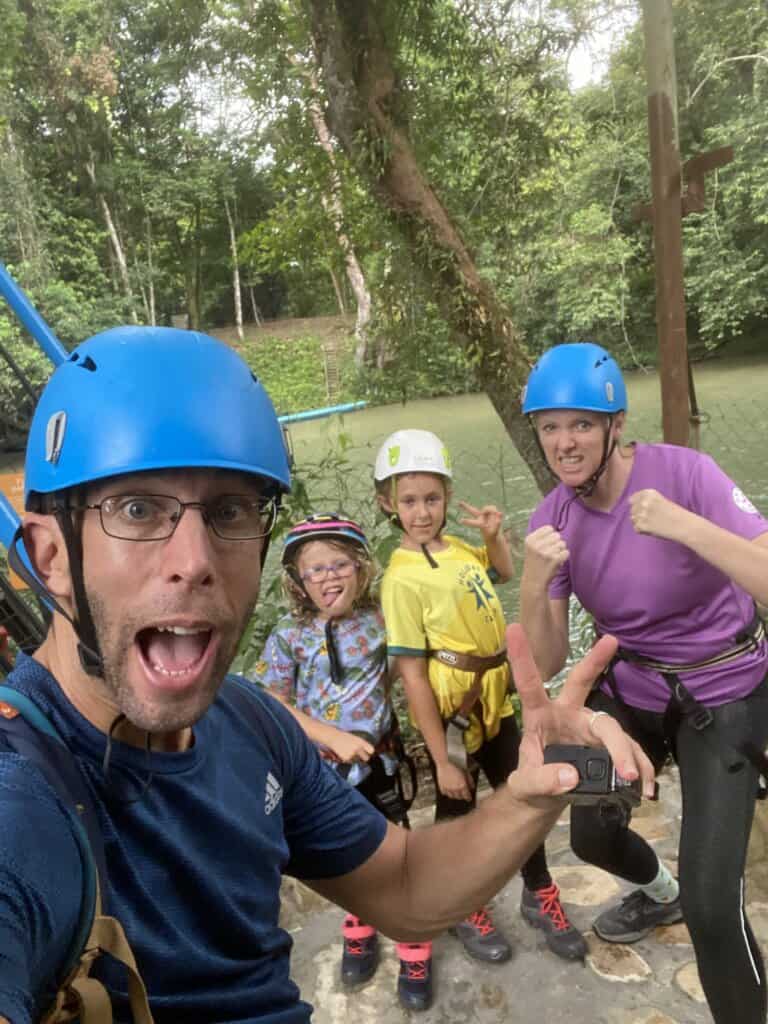
Ultimately, worldschooling is about experiential learning, embracing the endless possibilities that come with travel. From the people we meet, the cultures we dive into, the sights we see and all the everyday experiences along the way. It’s about instilling in our children a sense of wonder, curiosity, and resilience that will serve them well long after their formal education is complete.
So whether we’re exploring Ankor Wat by bike, Haggling in the markets and souks, visiting the Acropolis in Athens, beach crawling in Sri Lanka or 48hrs in Edinburgh every experience becomes an opportunity for growth and discovery.
Worldschooling Destinations
Anywhere can be a worldschooling destination really, but we do have some favourites. From our historical adventures in Egypt and Greece, to culturally rich Sri Lanka and Vietnam.
Whether its on an jungle hike in Borneo, attending Worldschool Hubs, or exploring the Dolomites in a campervan, Croatian islands, or surfing in Lombok, our adventures have been so much fun and filled with educational experiences.
We have been travelling and worldschooling full time since 2022 and one of the hardest parts is choosing where to go next. Planning fatigue is real folks, trust me it is easy get lost down the rabbit hole of flight comparisons, Air BnB options and family travel blogs.
So where to worldschool?
Here are some questions to help you choose a worldschooling destination for your family:
1. INTERESTS AND LEARNING GOALS
- What are your child’s interests?
- What subjects or topics do they want to learn more about?
- What kind of experiences do you want them to have?
- What are your family’s learning goals for this trip?
2. LOCATION AND CULTURE
- Where do you want to go?
- What kind of culture do you want to experience?
- What is the climate like?
- How affordable is the destination?
- What are the travel logistics like?
3. ACCOMMODATION AND RESOURCES
- What kind of accommodation do you need?
- What resources are available for worldschooling families?
- Are there any schools, libraries, or community centers that offer worldschooling programs or support?
- What are the safety and security concerns for families traveling with children?
4. PRACTICAL CONSIDERATIONS
- How long do you want to stay?
- How will you get around?
- What visas or permits do you need?
- How much money will you need?
- What is the healthcare situation like?
Sounds great, how do I start worldschooling?
There are no formal prerequisites or qualifications needed to become a worldschooling family. It’s not a program or curriculum you enroll in; it’s a way of life centered around travel and experiential learning.
Any one can Worldschool, it is as much a mindset as it is a lifestyle choice. It is accessible to anyone who wants to make it their priority, but it comes with its own set of rewards and challenges.
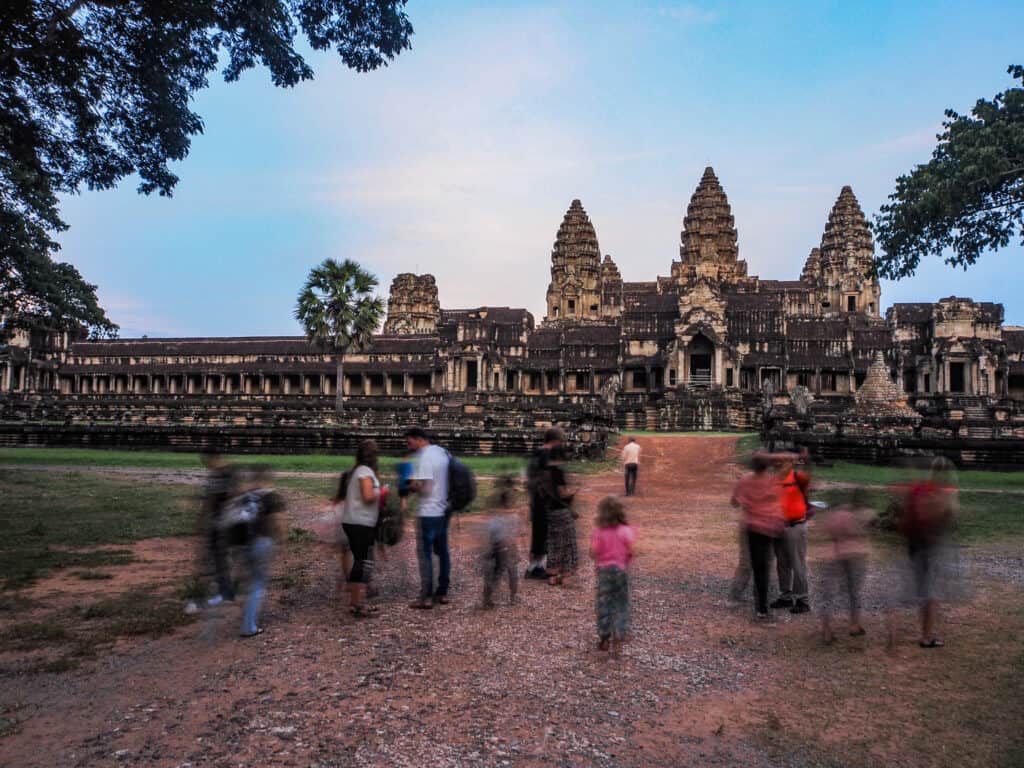
Worldschooling – the pros and cons
Traveling full time with kids may seem like a crazy idea, but consider this: the average American family spends just 37 minutes of quality time together per day during the week, and it’s not much better in the UK with families having just four hours of ‘quality time’ together every week. Maybe it’s not such a crazy idea after all.
Coming home from school, kids are exhausted, and parents are stressed. There’s cooking, cleaning, and preparing for the next day—it’s hard to find time to spend together. While problems don’t disappear when traveling full-time, they certainly happen in more exotic locations. Time and presence are major differences in our lives now.
The benefits of worldschooling
Let’s dive into some actual studies that support what I’m saying.
Mental Health Magic
Traveling isn’t just about seeing new places—it’s also a powerful tonic for your children’s mental health. Research suggests that exposure to new environments can reduce stress levels and enhance cognitive abilities (Molijn, 2022). Picture your kids basking in the sunshine, immersing themselves in outdoor adventures, and embracing new cultures. It’s a recipe for a happier, healthier life, fostering their well-being and personal growth (Durko & Petrick, 2013).
Our own experience has shown us that when children are engaged in subjects that truly captivate them, their motivation to learn soars. From planting seeds in Egypt to diving with sharks, it’s incredible to witness their enthusiasm for learning in action.
Real-Life Connections
Beyond academic learning, children gain essential life skills through travel. From budgeting and time management to navigating social situations, travel offers a real-world crash course in adulthood. By actively participating in travel planning and engaging with people from diverse backgrounds, children develop valuable life skills that will serve them well in the future.
Strong Family Bonds
Full-time travel isn’t just about adventure—it’s also an opportunity to strengthen family bonds. Spending quality time together creates unforgettable memories and deepens family connections. Research even suggests that travel can improve communication and strengthen lifelong family bonds (Durko & Petrick, 2013).
Flexibility and adaptability
This isn’t just a skill for kids, but us adults too. Travel can be challenging and teaching us how to navigate this is a life skill they will use again and again. Things don’t always go to plan…and that’s ok. Travel is an ever-changing adventure, full of surprises and uncertainties.
Kids who can embrace this lifestyle quickly develop the ability to adapt to new situations and environments, making them more flexible and resilient individuals. In a world that’s evolving at an unprecedented pace, these skills are vital.
Travel is all about experiencing the unfamiliar. This exposure to new experiences and a touch of healthy anxiety can actually enhance their performance and open their minds to embracing change.

OK, I MAY BE TOTALY BIASED BUT YOU CAN READ OUR FULL POST ON THE BENEFITS OF WORLDSCHOOLING HERE
The challenges of worldschooling
Ok, let’s keep it real. Family travel and worldschooling is not all sunshine and rainbows.
Balancing Work and School
One of the key challenges of worldschooling is balancing work commitments with your child’s education. It requires effective time management, patience, and flexibility to ensure that both professional responsibilities and educational needs are met without compromising quality. For example, we might need to schedule our online Tutoring around the kids learning activities or miss out on some activities during the day while one paren works and the other takes the kids out.
Responsibility for Learning
Worldschooling places the responsibility for your child’s education and academic progress squarely on your shoulders. This requires active involvement, whether you choose a structured online program or take on the role of teacher/facilitator yourself. Regardless of the approach, it demands continuous support and a willingness to adapt to meet your child’s evolving needs and the amount of time you have to invest.
Being resourceful and proactive in finding educational opportunities is crucial, whether through online resources, local activities, or interactions with other worldschooling families. While this responsibility may seem daunting, many worldschooling parents find it to be a rewarding and enriching experience as they witness their children learn and grow in diverse and exciting ways
It really is up to the parents how they educate their child(ren) whilst travelling.
If this is an area that is stressing you out, please get in touch. As a Worldschooling Coach my mission is to empower families like yours to confidently embark on a journey of discovery, exploration, and learning and feel confident about your educational choices.

Need expert guidance to get over your Worldschooling hurdles?
Join an experienced teacher and worldschool parent to unlock your confidence, gain clarity, unpack resources and strategies to tailor your bespoke educational plan.
Strain on Relationships
Trust me you can have too much of a good thing. While spending extended time together as a family is a significant advantage of worldschooling and one of the main reasons we love it, it can also put a strain on familial relationships if not managed effectively. Open communication, mutual respect, and conflict resolution skills are essential for maintaining healthy family dynamics. We have found that separating our girls every now and then, having our own personal time, embracing worldschool hubs and any offers from friends and relatives to meet up helps significantly.
Limited Personal Time
Embracing the multi faceted roles of educator, parent and never ending planning can mean sacrificing leisurely breaks and personal time. Finding moments for self-care and rejuvenation amidst the demands of worldschooling requires creativity and prioritisation.
Missing Family and Friends
Traveling the world with your family is an incredible experience, but it can also mean being far away from family and friends. Distance can sometimes amplify feelings of homesickness and longing for familiar faces. Staying connected through calls, messages, and video chats becomes essential to bridge the gap. We have returned ‘home’ a couple of times in the last few years to visit family and always jump at the chance of meeting up with people on our travels. We have met so many new friends on our travels and have made the effort to meet up again along the way.
Lack of Team Sports:
For kids and adults who thrive on team sports and structured activities, long-term travel can pose challenges. Finding opportunities for organised sports leagues or consistent training sessions is challenging. We tap into any opportunities when we can, but the consistency and team camaraderie from your team events is hard to find on the road.
Anyway, enough of that. We have found way more benefits than challenges and nothing that has broke us, yet … 😬
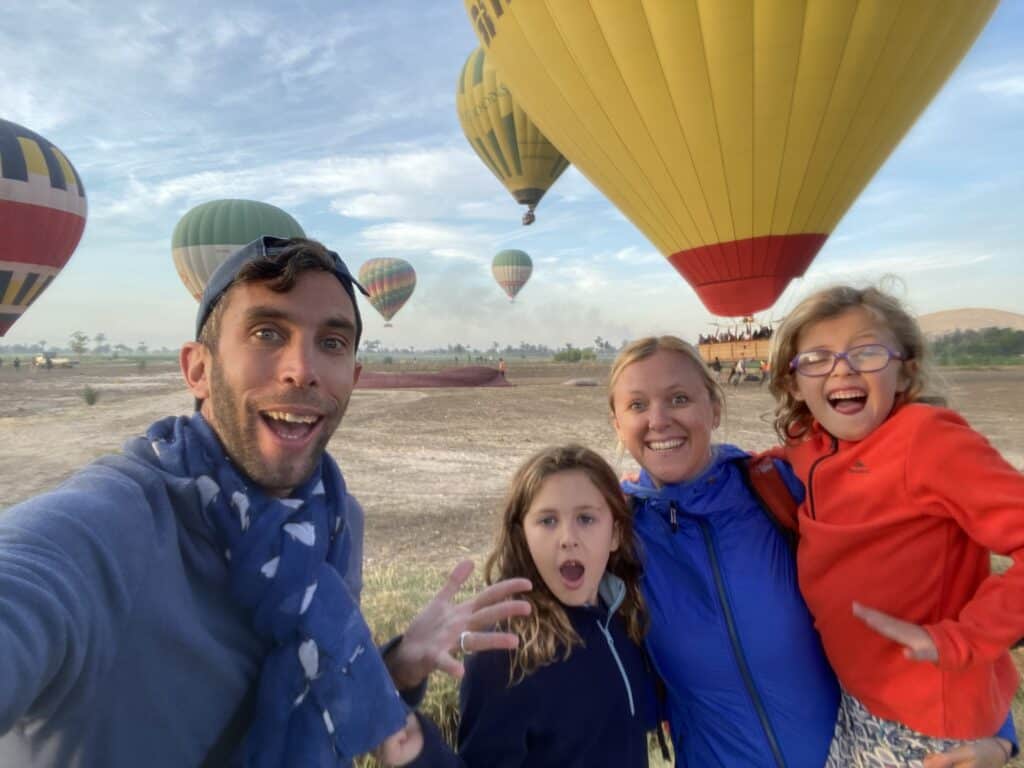
How to Worldschool
THERE IS NO ONE SIZE FITS ALL FOR WORLDSCHOOLING; EACH CHILD, FAMILY, DESTINATION AND LEARNING OPPORTUNITY IS UNIQUE. FLEXIBILITY IS KEY!
ME
Worldschooling opens up a world of possibilities for educating your children, quite literally. By traveling the globe and using each destination as a classroom, you can provide your children with a unique and immersive learning experience that goes beyond traditional textbooks and classrooms.
But how exactly do you worldschool?
Well that will differ depending your priorities, resources, destinations, learning styles and and you as a family.
Here are a few approaches:
- Use the World as Your Classroom: When you’re in a new country, take advantage of the local culture, history, and environment to teach your children. For example, if you’re in Italy, you could learn about Ancient Rome and Italian cuisine. In Iceland, you could study geology, volcanoes, and glaciers, and go whale watching to learn about different types of whales.
- Follow a Curriculum: If you prefer a more structured approach, you can choose from the many worldschooling curriculums available. These curriculums are designed for homeschooling families and can be a great resource for ensuring your children are meeting educational standards while traveling.
- Follow Your Child’s Interests: One of the benefits of worldschooling is the ability to tailor your child’s education to their interests. Let your child guide their learning, and support them as they explore topics that pique their curiosity. This approach can help keep them engaged and excited about learning.
For us we have found a balanced approach to worldschooling by combining these methods to create a comprehensive and engaging educational experience for our children. By incorporating academics, travel experiences, and self-directed learning, you can provide your children with a well-rounded education that is both exciting and enriching.
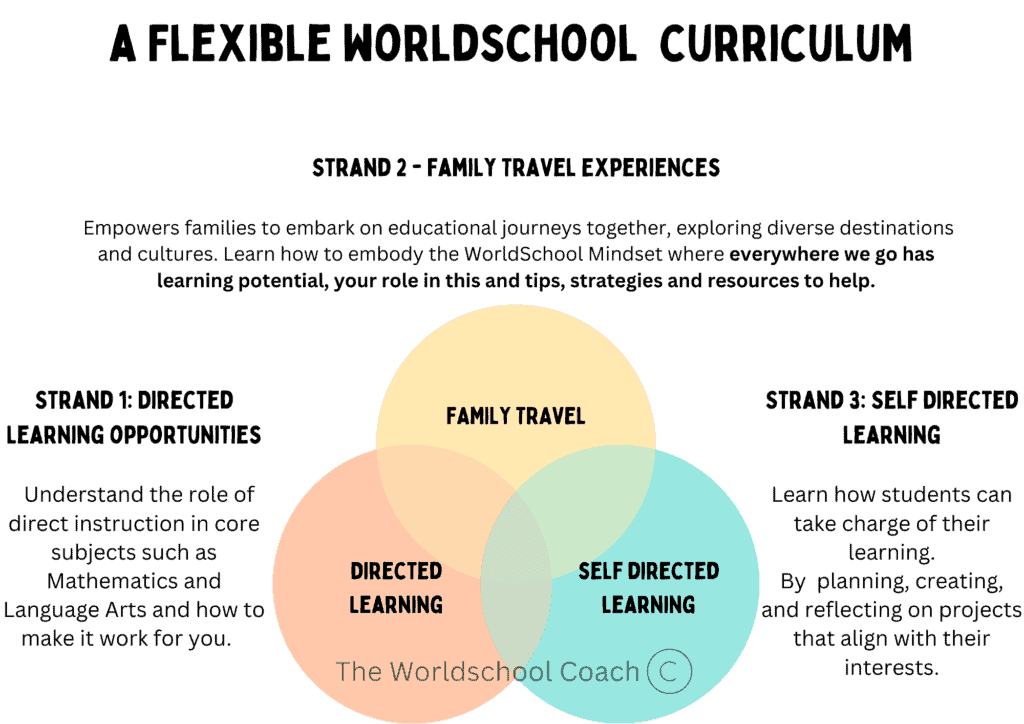
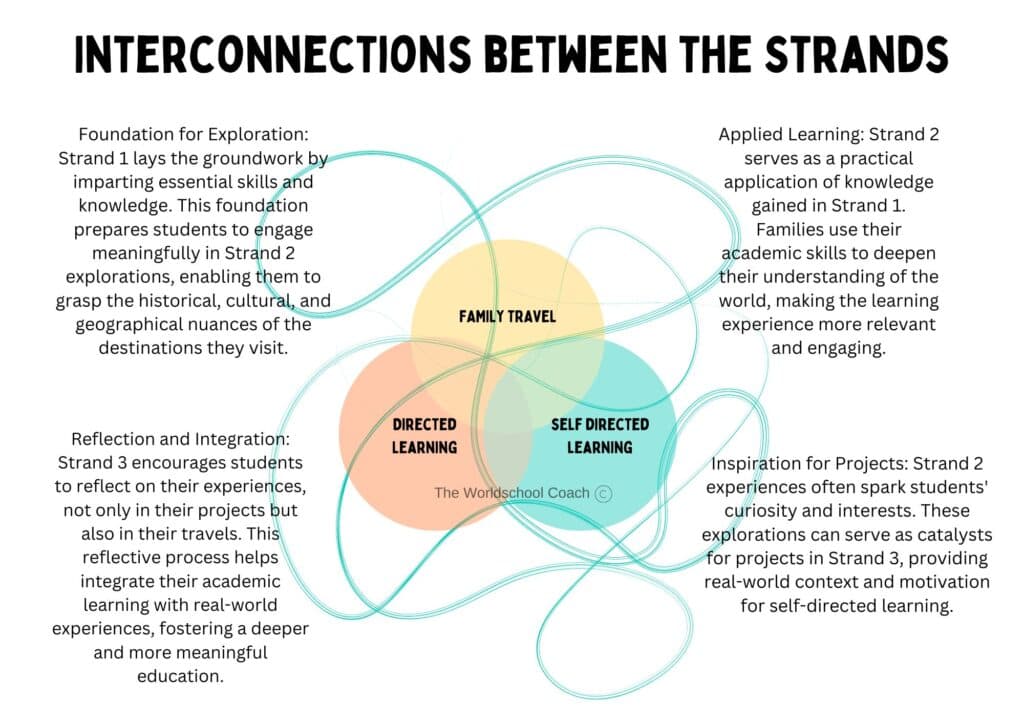
If you’re interested in learning more about how to worldschool or need support in getting started, consider enrolling in a worldschooling coaching service or tutoring program. These resources can provide you with the guidance and expertise you need to make the most of your adventures.
Common Worldschooling Questions
What about socialisation while worldschooling?
This is probably the one we get the most, along with “what about their school work?”
Worldschooling provides unique opportunities for children to interact with individuals from a huge range of backgrounds and cultures. Encourage participation in local activities, join online communities, and seek out worldschooling hubs or social groups in your destination.
Connecting with other worldschooling families is basically your cheat code. They’ve got the lowdown on where to find the best learning experiences, dodge the inevitable potholes, and keep the whole adventure rolling. Join facebook groups such as Wordschool Hubs and Community, Worldschooling Notice Board or consider joining a hub to meet other families.
You can read the full post in the link above but here are some of the hubs we have been to and on our future radar.
Worldschool Hubs
Arctic Terns – Worldschool Bansko – The magic of Worldschooling Bansko lays not in the great range of activities, but in the families coming together, sharing their time together, creating connections, and forming friendships for life.
Worldschool Pop ups – Temporary, mobile, week-long gatherings designed to bring worldschoolers together to develop community and explore our planet. Pop-ups can happen at any location, at any time.
Deliberate Detour (get $200 0ff with the code Boston200) – two and four-week experiences in some of the world’s most beautiful, culturally-rich cities.
Shepherds Rest – A self directed rural Worldschool Community, Oria, Spain. We loved this community and beautiful setting, with fab hosts Joel and Corry, you are in great hands.
Bosnia Worldschooling Hub – Nature exploration – We are heading here this summer and really looking forward to this off the beaten path destination, connecting with the wild, habitats, animals and how to survive in the nature.
https://www.nomadswithkids.org is a great place to start looking for flexible learning spaces for kids all around the world.
Looking for more links? Download our FREE Worldschool Starter Kit by subscribing o our newsletter below.
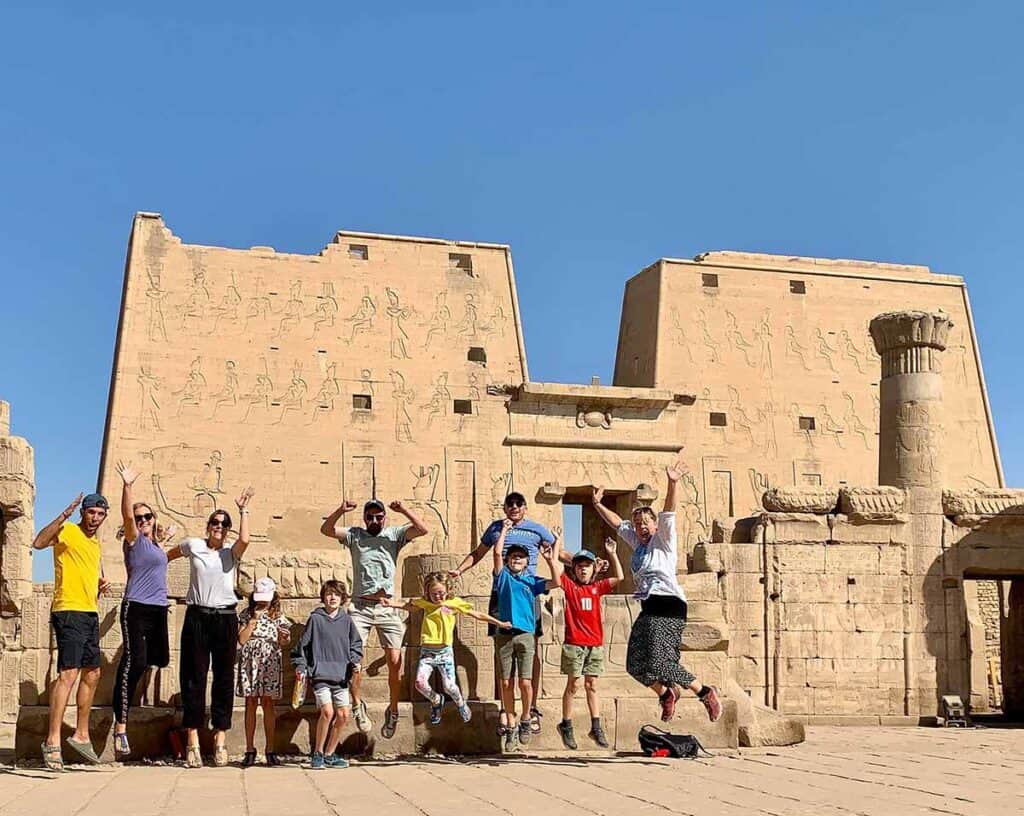
Will my kids fall behind in their learning?
It’s natural to worry about academic progress when transitioning to worldschooling and let’s be honest it’s not for everyone. Each child has their own learning style after all. However, many families find that their children thrive in this environment, gaining valuable real-world experiences and diverse cultural insights that traditional schooling may not offer. By focusing on holistic learning and personalised educational approaches, you can ensure that your children continue to grow and develop academically, emotionally, and socially. It will always be tricky to measure one against the other but
Personally, we accept that while the academics may not be as rigorous as traditional schooling the benefits to the whole child outweigh any concern. The real world skills, understanding and perspective they gain from travel is such a valuable experience and adds a whole new level as the academics they do learn have context for future life.
Through travel we have witnessed our kids develop in so many way that would not have been possible in traditional schools. :
❤️Resilience and problem-solving
❤️Understanding of cultural history and origins
❤️Respect and tolerance for diversity
❤️Empathy development
❤️Adaptability to different situations
❤️Communication and social skills
What resources will I need?
The resources needed for worldschooling will vary depending on your family’s preferences, educational approach, and travel style. However, some essential resources to consider include educational materials such as textbooks, workbooks, and online learning platforms tailored to your children’s ages and learning levels. Additionally, access to reliable internet connectivity and electronic devices like laptops, kindle or tablets can facilitate remote learning and research while on the road.
However, the real gems are the experiential resources such as museum passes, cultural guides, and outdoor exploration gear to enrich your children’s hands-on learning experiences.
We have a growing list of educational resources for Worldschooling subjects such as art, science, wellbeing, creative thinking and more on our RESOURCES PAGE.
Here are few of the kids favourite apps at the moment;
The kids have helped us out with this one to share their thoughts on what they enjoy using too.
Prodigy: 🧙♂️
We love Prodigy because it’s like a magical math adventure! You get to battle cool creatures while practicing math. It makes learning math fun, and we get to level up our wizard skills!
You can get a FREE ACCOUNT Here and try it our for yourself.
Night Zoo Keeper: 🌙🦁
This one’s awesome because we get to create our own animals and write stories about them. It’s like having our very own night zoo! Plus, the Night Zookeeper helps us become better writers. 📝🌟
USA – Get a 7-day FREE trial & 50% OFF an annual subscription to Night Zookeeper.
UK – Get a 7-day FREE trial & 50% OFF an annual subscription to Night Zookeeper.
CA – Get 50% OFF an annual subscription to Night Zookeeper
TT Rockstars: 🎸
Rocking out with math? Yep, that’s what TT Rockstars is all about! It’s like a concert where we play air guitar and solve math problems. We love competing and getting faster at math. 🎵🤘
10% off for the first 10 signups with this code – TheBostonFamily
Sign up Here

KidsPod:🎧📚
A podcast app for kids – all their favorites in one place. Audio books and podcasts are a lifesaver for family travel. We love the range of podcasts and with over 550 well selected podcasts you get peace of mind that the kids can listen to all their favourites while not being able to find anything inappropriate.
Its educational too, a win win, tap into children’s imaginations, improve their reading skills and nurture their love for storytelling while you travel.

YouTube: 📺
Last but not least, YouTube is our go-to place for learning about everything! From cool science experiments to fun history lessons, there’s something for everyone. We even find cool travel vlogs to inspire our next adventure! 🌄🎥
Here are a few of. our favourites ;
- Watch this collection of book trailers from Scholastic. Quick idea – Make your own trailer for one of your favourite books.
- This playlist from BBC Teach is a great list of practical application, showing how maths is used in different areas of life and work. It also includes videos about number, measure and shape concepts.
- Our kids favourite ** Learning about animals with this playlist from National Geographic Kids.
- I think I love this one just as much as the kids, The Horrible Histories channel has some awesome videos and songs to learn about different periods from history.
What is the best age for worldschooling?
Choosing the right age for worldschooling is a decision many families ponder as they plan their educational journey. While there is no one-size-fits-all answer, several factors may help determine the ‘best’ age for worldschooling.
If your goal is to stay on track with a formal curriculum and prepare for education exams that can keep future job opportunities open, incorporating an element of formal schooling is going to be essential. This is particularly important for subjects that require more structured learning and assessment, such as math, science, and language arts.
From my experience, Worldschooling can be easier for children under 11 years of age compared to their GCSE or A Level years. Younger children are more adaptable to new environments and experiences, making it easier for them to learn from travel. However, children under 5 may not necessarily absorb all learning experiences through travel in the same way as older children or teenagers.
For a good balance, the late primary years (ages 7-10) are often considered a good age for worldschooling.
In our own experience with our girls at this age, we found that they were able to fully engage with the educational opportunities presented during our travels. They were old enough to understand different cultures, histories, and landscapes, but young enough to be open-minded and adaptable to new experiences. In an hour or so each day we can ‘keep on track’ with the academic subjects and make the most of the travel opportunities.
We have also met families with older kids who are crushing it, completing exams after years of worldschooling and finding balance between travel and higher education. This shows that worldschooling can be successful at any age, as long as there is a commitment to education and a willingness to adapt to changing circumstances.
The best age for worldschooling ultimately depends on your child’s individual development, interests, and your family’s educational goals.
How much does worldschooling cost?
Now here we are talking about the educational side, ‘How to afford travel with kids’ is a whole other question.
So, how much does worldschooling cost?
Its FREE! well sort of, travel is the greatest teacher after all. But in reality there will be costs for online learning, apps, resources, clubs, activities etc.
Affording to worldschool, while often portrayed as a carefree, budget-friendly adventure, does come with its financial considerations, especially when it comes to the educational aspects. While travel itself can be seen as the teacher, there are additional costs for online learning, apps, resources, clubs, and activities that can enhance your child’s educational experience.
One way to manage these costs is by budgeting and planning ahead. Researching free or low-cost educational resources online can help supplement your child’s learning without breaking the bank. Many websites offer free educational materials, courses, and videos that cover a wide range of subjects and topics.
Another option is to take advantage of educational apps and online platforms that offer affordable or subscription-based access to educational content. These apps often provide interactive learning experiences that can be tailored to your child’s needs and interests.
Additionally, consider joining local clubs or organizations that offer educational activities and opportunities for children. These can be a great way for your child to socialize and learn in a structured environment without the high costs associated with traditional schooling.
Finally, be open to alternative forms of education that may not require significant financial investment. Worldschooling is about embracing the world as your classroom, and there are countless ways to learn and grow without spending a fortune. By being resourceful and creative, you can provide your child with a rich and fulfilling educational experience without breaking the bank.
Is Worldschooling Safe?
For families new to travel, the idea of traveling with kids can seem daunting. However, international travel is generally safe, whether you’re with your kids or not. Of course, there are always risks involved in any type of travel, but these can be minimized with proper precautions.
Just like in your own neighborhood, it’s important to exercise caution and common sense while traveling. Look both ways before crossing the street, practice good hygiene, and avoid unsafe areas, especially at night.
Interestingly, traveling with kids can actually be safer than traveling without them. In my experience, people around the world are often more accommodating and willing to help families with children, making the experience more enjoyable and safer overall.
Here are some tips we would consider common sense in new destinations.
- Be Aware of Your Surroundings: Stay vigilant and aware of your surroundings, especially in crowded or unfamiliar areas.
- Stay Together: Keep your family members close, especially in busy or crowded places. Use buddy systems for older children to ensure no one gets lost.
- Stay Hydrated and Nourished: Carry water and snacks to stay energized and hydrated, especially in hot or unfamiliar climates.
- Follow Local Laws and Customs: Be aware of and respect the local laws and customs of the places you visit.
- Stay Connected: Keep your mobile phones charged and have a plan to stay in touch with each other, especially in crowded or unfamiliar places.
- Keep Important Documents Safe: Store passports, IDs, and other important documents in a secure place, and have copies of them stored separately.
- Be Cautious with Strangers: Teach children to be wary of strangers and to seek help from authorities if they feel unsafe.
- Have an Emergency Plan: Know emergency contact numbers and have a plan in place in case of emergencies.
Most importantly, Trust Your Instincts: If something feels wrong or unsafe, trust your instincts and take necessary precautions.
Is Worldschooling Legal?
The legality of worldschooling varies depending on your home country and how you define worldschooling. If by worldschooling you mean enhancing your child’s education through travel experiences while maintaining a traditional educational system, then yes, it is generally legal. However, if you plan for worldschooling to be the primary form of education for your children, the situation becomes more nuanced.
In many countries, including the UK and the US, parents have the right to homeschool their children. This means they can choose not to send their children to traditional schools and instead educate them at home. However, there are often regulations and requirements that homeschooling parents must adhere to, such as following a certain curriculum, keeping records of educational progress, and sometimes undergoing assessments.
When it comes to worldschooling, where education is primarily experiential and takes place through travel, the legalities can be more complicated. Some countries may not have specific regulations for this type of education, while others may require families to follow homeschooling guidelines.
It’s important for families considering worldschooling to research the laws and regulations in their home country and any countries they plan to visit. Seeking advice from homeschooling associations or legal professionals can help ensure that you are compliant with relevant laws and requirements.
If you have any more burning worldschooling questions be sure to drop us an email or reach out on our social media.
Worldschooling Blog Posts
- Top Tips for Starting a Worldschooling Life: Budgeting, Planning, Resources

- Every fact you wanted to know about Egypt!

- What do you need for worldschooling success?

- Travelling with Kids- The key life lessons they learn

- Top 10 amazing things you might not know about Worldschooling

- How to choose an epic worldschooling destination

- Raising Readers – How to nurture a love of reading with Kindle for Kids

- Exploring Worldschool Communities for Family Travel

- Unlocking Travel Secrets: Quick Fire Travel Questions Answered

- Unveiling the Wonders of the Worldschool Hub

- How Family Travel Enriches Your Child’s Education


Need expert guidance to get over your Worldschooling hurdles?
At the Worldschool Coach our mission is to empower families like yours to confidently embark on a journey of discovery, exploration, and learning that unfolds across the globe.
Join an experienced teacher and worldschool parent to unlock your confidence, gain clarity, unpack resources and strategies to tailor your bespoke educational plan.

Meet the author
Jak is co founder of Boston Tribe Travels. He has lived and travelled abroad for over 15 years with his family. He has taught in International schools around the world as a primary teacher and leader. He now travels full time with his family, worldschooling and coaching other families to follow their worldschool dream.

